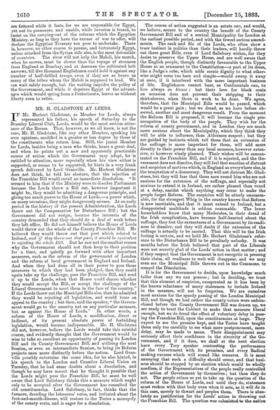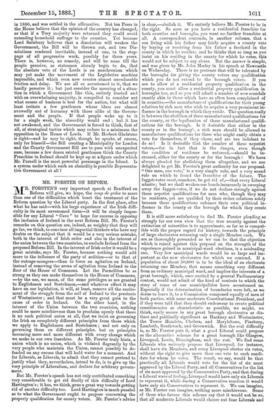MR. H. GLADSTONE AT LEEDS.
IF Mr. Herbert Gladstone, as Member for Leeds, always represented his father, his speech of Saturday to the Bramley Liberal Club, Leeds, would be the most serious utter- ance of the Recess. That, however, as we all know, is not the case, Mr. H. Gladstone, like any other Member, speaking his own opinions, modified in a greater or less degree by those of the constituents who return him. Still, the junior Member for Leeds, besides being a man who thinks, hears a great deal, and when he points out a new and apparently practicable course of action which the Government may adopt, he is entitled to attention, more especially when his view either is supported, or seems to be supported, by hints in a very frank speech delivered by Lord Granville. Mr. Herbert Gladstone does not think, he told his electors, that the rejection of the Franchise Bill would entail an immediate dissolution. "It seemed to him that if the Ministry were to dissolve Parliament because the Lords threw a Bill out, however important it might be, they would be admitting a dangerous principle, and giving too much power to the House of Lords,—a power which, on many occasions, they might dangerously misuse. At an early period in the history of the present Administration, the Lords threw out the Compensation for Disturbance Bill ; but the Government did not resign, because the interests of the country demanded that they should do a deal of work before they left office. He did not himself believe the House of Lords would throw out the whole of the County Franchise Bill. He believed they would throw out that part which related to Ireland, and if they threw out that part, it would be equivalent to rejecting the whole Bill. But he saw not the smallest reason why the Government should not then keep to their position for a time, and quietly go forward with other important measures, such as the reform of the government of London and the reform of local government in England and Ireland. And when they had done all in their power to pass those measures to which they had been pledged, then they could again take up the challenge, pass the Franchise Bill, and send it up to the Lords, when that House could choose whether they would accept the Bill, or accept the challenge of the Liberal Government to meet them in the face of the country." If the Lords threw out the Municipal Bills also, then he admitted they would be rejecting all legislation, and would force an appeal to the country ; but then, said the speaker, " the Govern- ment would go to the country not on any particular measure, but as against the House of Lords." In other words, a reform of the House of Lords, a modification, direct or indirect, of its present absolute power of forbidding legislation, would become indispensable. Mr. H. Gladstone did not, however, believe the Lords would take this suicidal course, and evidently thought that the Government would be wise to take so excellent an opportunity of passing its London Bill and its County Government Bill, and utilising the next Session, or even an intermediate Session, to bring its Reform projects once more distinctly before the nation. Lord Gran- ville possibly entertains the same idea, for he also hinted, in his speech to the London and Counties Liberal Union on Tuesday, that he had some doubts about a dissolution, and though he may have meant that he thought it possible that the Lords might pass the Franchise Bill, he must be well aware that Lord Salisbury thinks this a measure which ought only to be accepted after the Government has consulted the old constitueneies. Lord Salisbury, in fact, thinks that the farmers, dreading the labourers' votes, and irritated about the foot-and-mouth-disease, will restore to the Tories a monopoly of the county seats, and is eager for a dissolution. The course of action suggested is an astute one, and would, we believe, secure to the country the benefit of the County Government Bill and of a central Municipality for London at the earliest possible period, and with the fewest serious amend- ments. The rank and file of the Lords, who often show a truer instinct in politics than their leaders, will hardly throw out three great Bills, even if Lord Salisbury wishes, for they desire to preserve the Upper House, and are well aware that the English people, though distinctly favourable to the Upper House as an ornament to the Constitution—a part of its dress, like a Judge's robe, which adds scenic dignity to what other- wise might seem too bare and simple—would sweep it away at once, if it interfered with the more important business of life. Englishmen cannot bear, as Continentals can, to live always en blouse ; but their love for black coats on occasion does not prevent their stripping to their shirt-sleeves, when there is work to be done. We agree, therefore, that the Municipal Bills would be passed, which would be a great gain ; but we dread, as we have before ob- served, another and most dangerous result. From the moment the Reform Bill is proposed, it will become the single pre- occupation of the body of the people. They wish for the reform of county government, and in London they are much more anxious about the Municipality, which they think they will be able to influence, than Aldermen suspect ; but they are guided by instincts which tell them that an extension of the suffrage is more important for them, will add more directly to their power than any local measure, however exten- sive, or however wisely planned. Their wishes will be concen- trated on the Franchise Bill, and if it is rejected, and the Go- vernment does not dissolve, they will feel that emotion of distrust and suspicion of motives which, in England as everywhere else, is the temptation of a democracy. They will not distrust Mr. Glad- stone, but they will fear that those men round him who are not anxious for the extension of the suffrage, and especially not anxious to extend it in Ireland, are rather pleased than vexed at a delay, amidst which anything may occur to make the people forget Reform. The suspicion will be utterly unreason- able, for the strongest Whig in the country knows that Reform is now inevitable, and that it must extend to Ireland, but a disappointed multitude is seldom reasonable. The lower householders know that many Moderates, in their dread of the Irish complication, have become half-hearted about the suffrage, they test the earnestness of a Government by its readi- ness to dissolve, and they will doubt if the extension of the suffrage is actually to be carried. That this will be the Irish feeling is certain, and we hold Mr. Herbert Gladstone's refer- ence to the Disturbance Bill to be peculiarly unlucky. It was months before the Irish believed that part of the Liberals were not secretly glad of the Lords' action in that matter ; and if they suspect that the Government is not energetic in pressing their claim, all readiness to wait will disappear, and we may even see the Municipal Bills thrown out in the Commons, to compel the Dissolution.
It is for the Government to decide, upon knowledge much fuller than any we can possess ; , but in deciding, we trust that this element of suspicion, exasperated as it has been by the known reluctance of many statesmen to include Ireland in the measure, will not be forgotten. We are ourselves most anxious for the speedy passing of the London Municipal Bill, and though we had rather the county voters were enfran- chised before the County Government Bill was drawn up, we are ready to trust the Cabinet to make that measure liberal enough, but we do dread the effect of voluntary delay in. pass- ing the Franchise Bill, upon the constituencies at large. They expect to see the promise kept, and the Tories have taught them only too carefully to see what mere postponement, mere delay, may be made to mean. Their disappointment may seriously affect their confidence in the sincerity of the Go- vernment, and if it does, we shall at the next election have every Tory speaker contrasting the performance of the Government with its promises, and every Radical making excuses which will sound like censures. It is most annoying that such a difficulty should occur, and that busi- ness should be stopped by an election which would be wholly needless, if the Representatives of the people really controlled the action of Government by themselves ; but then they do not. The people refuse as yet to take up the question of the reform of the House of Lords, and until they do, statesmen must reckon with that body even when it acts, as it will do in this case, merely to thwart and perplex them. There is abso- lutely no justification for the Lords' action in throwing out the. Franchise Bill. The question was submitted to the nation in 1880, and was settled in the affirmative. Not ten Peers in the House believe that the opinion of the country has changed, or that if a Tory majority were returned they could avoid extending household suffrage to the counties. Yet because Lord Salisbury believes that a dissolution will weaken the Government, the Bill will be thrown out, and two Dis- solutions rendered inevitable, instead of one, to the stop- page of all progressive work, possibly for three years. There is, however, no remedy, and will be none till the people perceive, as statesmen already begin to do, that the absolute veto of the Lords is an anachronism which may yet make the movement of the Legislative machine impossible, and which even now creates almost unendurable friction and delay. We are all so accustomed to it, that we hardly perceive it ; but just consider the meaning of a situa- tion in which a Government like this, entirely trusted and with an overwhelming majority, is compelled to consider not what course of business is best for the nation, but what will least irritate a few gentlemen whose ideas are almost avowedly out of harmony with those alike of the Govern- ment and the people. If that people woke up to it for a single week, the absurdity would end ; but it has not awakened, and the Government is forced to think, first of all, of strategical tactics which may reduce to a minimum the opposition in the House of Lords. If Mr. Herbert Gladstone is right—and he may be right, though he speaks, of course, only for himself—the Bill creating a Municipality for London and the County Government Bill are to pass with unexpected ease, because a few dozen estated gentlemen think the County Franchise in Ireland should be kept up at a figure under which Mr. Parnell is the most powerful personage in the Island. Is a system under which such an absurdity is possible Representa- tive Government at all ?











































 Previous page
Previous page